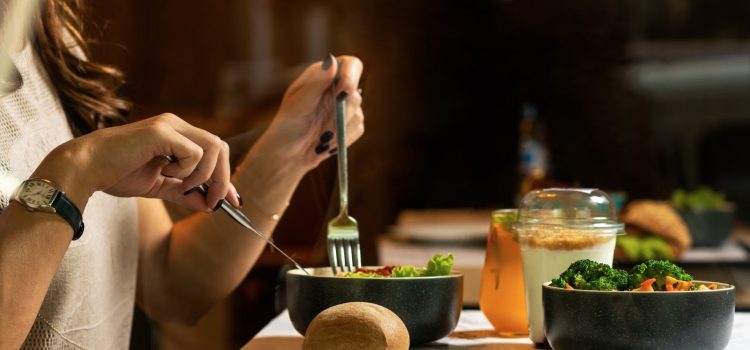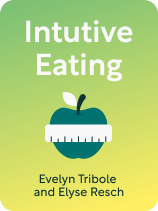

This article is an excerpt from the Shortform book guide to "Intuitive Eating" by Evelyn Tribole and Elyse Resch. Shortform has the world's best summaries and analyses of books you should be reading.
Like this article? Sign up for a free trial here.
Why should you prioritize appealing food? What’s the difference between food satisfaction and food morality?
An essential way to tune into your body’s needs is to prioritize food satisfaction over food morality. This includes rejecting judgments and biases associated with food, focusing on how different foods make your body feel, and giving yourself unconditional permission to eat what you want.
Below is advice on how to love food without feeling guilty about eating.
Prioritize Food Satisfaction Over Food Morality
Intuitive Eating by Evelyn Tribole and Elyse Resch explains that shifting away from food morality to food satisfaction helps you avoid the cycle of dieting, intense cravings, indulgence, and guilt. To overcome the cycle of dieting and negative self-judgment, they suggest focusing on how foods nourish and satisfy your body, rather than labeling them as “good” or “bad.” They recommend the following steps for achieving this:
1) List all of the foods that appeal to you and identify those you’ve been judging as “bad.”
2) Eat each of these so-called “bad” foods, paying close attention to how they make you feel physically. For example, you might identify fries as “bad” and note that eating more than a handful satisfies your taste buds but makes you feel bloated and lethargic.
3) Identify any judgments that trigger feelings of guilt or shame associated with eating these foods. For example, you might believe that fries have no nutritional value, leading to a sense of wrongdoing when consuming them.
4) Examine whether your judgments align with your body’s needs. For example, question why you believe fries have no nutritional value, if this belief truly benefits your well-being, and if fries can fulfill your physical needs when eaten in moderation.
5) Give yourself permission to continue eating the foods that make your body feel good, and allow yourself to savor the experience of eating them without guilt or self-judgment.
Question, Fact-Check, and Reframe Moral Food Labels
Eating disorder specialists offer complementary advice for prioritizing food satisfaction over food morality. Like Tribole and Resch’s advice, it includes self-reflection, and it also adds a fact-checking step to help you reframe ideas about food morality and describe food objectively.
1) Consider why you assigned specific food labels and how these labels impact you by answering the following questions:
- What or who is the original source of the label?
- Should you be giving that source authority?
- What rules have you created for that food based on its given moral value?
- What happens if you eat “good” food?
- What happens if you eat “bad” food?
- Does assigning moral value to the food help you be more flexible with your eating?
- What would happen if you let go of the label altogether?
- How would letting go of the label change your relationship with that food?
- Would you tell anyone else to use this morality system to guide their eating habits?
2) Engage in fact-checking to determine if your food judgments are objectively true. Achieve this by seeking credible sources and scientific research to validate or debunk the claims you’ve assumed about specific foods.
3) Release guilt and self-judgment for your food choices by using neutral, objective language to describe food. For instance, instead of labeling cookies as “junk” food, use descriptive terms like “flavored biscuits” or “crumbly baked goods” that focus on texture, smell, or other objective characteristics.
Focusing on What Feels Good to Your Body Helps Fulfill Your Nutritional Needs
According to Tribole and Resch, in addition to helping you cultivate a healthy relationship with food, releasing food judgments also helps you fulfill your nutritional needs. While the authors emphasize the importance of getting all the nutrients your body needs, they acknowledge that maintaining your nutritional needs without experiencing negative emotions can be challenging, as it involves making food judgments. For example, feeling like you should eat a salad instead of fries because it’s the healthier option may trigger conflicting emotions such as guilt for preferring fries and resentment for depriving yourself of what you want.
However, by following the preceding advice and focusing on what feels good to your body, you’ll become more conscious of how food affects you physically, and you’ll naturally choose foods that feel satisfying and meet your nutritional needs. Additionally, because you’ll no longer deprive yourself of so-called unhealthy foods, your cravings for them will diminish.
(Shortform note: Michael Greger (How Not to Diet) offers advice that may seem contradictory to the authors’ advice for tuning in to your body’s needs but actually complements it. While Tribole and Resch say that you should never make food judgments or deprive yourself, Greger argues that you should avoid highly processed foods because they’re never good for your health—they cause numerous diseases and can desensitize your palate, making natural foods less appealing. Most importantly, they’re engineered to encourage overeating, which disrupts your body’s hunger and fullness cues. Therefore, by steering clear of highly processed foods, you’ll find it easier to attune to your body and make choices that align with your overall well-being.)

———End of Preview———
Like what you just read? Read the rest of the world's best book summary and analysis of Evelyn Tribole and Elyse Resch's "Intuitive Eating" at Shortform.
Here's what you'll find in our full Intuitive Eating summary:
- Why eating is often associated with guilt, shame, and fear
- How diets damage your relationship with food
- Ways to cultivate a healthy relationship with food






